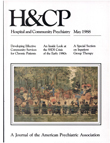The Clinical Use of EEG in a General Psychiatric Setting
Abstract
In a university teaching hospital, the charts of 150 psychiatric inpatients consecutively referred for EEG were reviewed to survey the clinical use of the EEG by psychiatrists. Individual psychiatrists referred between 18 and 31 percent of their caseloads, and 11.3 percent of the EEGs were abnormal. The only dinical indications significantly associated with an abnormal EEG were a history of epilepsy and suspicion of a recent seizure, The presence of an organic factor, which was previously identified in the history, mental status examination, or physical examination of 58 percent of the patients, was significantly associated with an ab- normal EEG. However, none of the abnormal EEGs helped identify an organic etiology that was not already diagnosed, and in three cases clinicians appeared to ignore abnormal EEG results. Based on these data, the authors discourage the routine use of the EEG for psychiatric patients, rec- ommending that an EEG be considered only when the clinical history and findings suggest an underlying organic disorder.
Access content
To read the fulltext, please use one of the options below to sign in or purchase access.- Personal login
- Institutional Login
- Sign in via OpenAthens
- Register for access
-
Please login/register if you wish to pair your device and check access availability.
Not a subscriber?
PsychiatryOnline subscription options offer access to the DSM-5 library, books, journals, CME, and patient resources. This all-in-one virtual library provides psychiatrists and mental health professionals with key resources for diagnosis, treatment, research, and professional development.
Need more help? PsychiatryOnline Customer Service may be reached by emailing [email protected] or by calling 800-368-5777 (in the U.S.) or 703-907-7322 (outside the U.S.).



